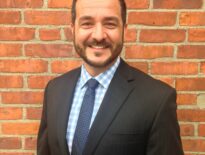Jeffrey Sullivan
President and CEO, New Valley Bank & Trust
Age: 56
Industry experience: 34 years
Jeffrey Sullivan was part of a small group of long-time bankers who thought western Massachusetts needed more options for small business lending. After market research and interviews with more than 100 people supported this notion, they decided to open Massachusetts’ first de novo bank in a decade. Raising $23.5 million from 300 local investors, New Valley Bank & Trust opened at the end of May 2019 with Sullivan as president and CEO. The bank finished 2019 with $63 million in total assets, $43 million in total deposits and $29 million worth of loans outstanding.
Q: How has the start–up been going?
A: I think there’s a lot of things that were not expected. We’ve had some negative surprises: folks who we thought were going to come with us as investors or customers who didn’t, some frustrations along the lines of trying to put all the technology together. But also a lot of positive surprises: people who have been coming out of the woodwork to support us, both shareholders and now a real steady stream of people coming in to become customers. We’re getting walk–in traffic at our branch, which we didn’t really count on. We’re generating business not only in commercial loans but in residential mortgage loans, which was not something that we planned for.
We’ve also been really pleased with the quality of people who have come to work for us. We’ve got a great team of people, great board, great shareholder base. It’s all slowly but surely falling into place. We don’t have a big marketing budget, so trying to grow the business by word of mouth, creating a positive image of our brand in the community – those are the things we are trying to do now.
Q: What has been the community reaction?
A: What we’re really hearing loudly is that for our niche – to have a focus on small business, to have really highly qualified staff and a really knowledgeable board of directors who are movers and shakers within our community – that is resonating with people. They want to join and become part of our bank and become part of the story. But it’s hard work. There’s no shortage of competition in the marketplace. We really try to stay in our lane. We’re really trying to stay in our niche and not try to be all things to all people.
Q: What approach did you take to deciding what technology to use?
A: We spent a lot of time doing research before we made the decisions. At the end of the day, I think the philosophy that guided us was to make sure that we had a very dependable core platform, tried and true. We chose a vendor we had complete confidence in, COCC. We’ve tried to balance off the exciting fintech opportunities with the dependability of a good provider.
When we were doing our research, we wanted to make sure that the regulators were happy with the technology providers, that they had all the right internal controls in place. By and large, we didn’t want to be the first one to use a new platform. We wanted to make sure it was successful somewhere else – close to the bleeding edge but not right on the bleeding edge in terms of the technology choices we made.
Q: What were some regulatory challenges?
A: The regulators have actually been great. That’s been one of those pleasant surprises. Particularly the folks at FDIC and the Division of Banks have been very good to work with. The new commissioner in Massachusetts, Mary Gallagher, has been a great advocate for us. One of the things that we didn’t expect is the level of depth of the reviews the examiners did even before we opened. We had a three to four week visit from the regulators about seven or eight months before we opened, and they went through all of our systems, went through all of our policies and procedures. In a way, it was like free consulting.
Q: What have been some other surprises?
A: It’s not all roses. As pleasantly surprised as we were with the regulators, we found the capital markets to be very challenging. It’s hard to raise money no matter what size your institution is right now. Banks are somewhat out of favor in terms of the investment community. People are choosing to chase other opportunities with their money – the stock market is hot, the real estate market is hot, the cannabis industry was coming online at the same time we were out raising money. We’ve got a great investor base, but it took a few months longer than we thought it was going to take.
Q: How did the year-end numbers match up with expectations?
A: We’re pretty much hitting our stride in terms of deposits. We’re a little bit ahead on loans from what we had planned. The three rate cuts that happened during the second half of 2019 – the drop in short-term rates while we were just opening the doors – that hurt us. It’s hurt all banks, but it hurt us a little bit harder because so much of our money was just sitting in cash when we first opened the doors. The balance sheet is hitting expectations, but we’re a little squeezed on the margin from what we had originally projected.
Q What plans do you have for 2020?
A: We’re really focusing on trying to perfect our small business banking platform. We’re going to have an online business lending platform that’ll be up and running by the end of the first quarter. It’s an integrated end-to-end lending platform, paperless, and so we’re really excited about that. And we’re looking to do the same thing for online deposit–opening capabilities.
One of the goals that the board has is to make sure 100 percent of our shareholders are doing business with us as customers. So, we’re focused on giving those shareholders a really good first impression, start to do business with them and hope that they will be our word–of–mouth referral sources going forward.
One of the other things we’re benefiting from – and hope to continue to benefit from – is that our regional economy in western Massachusetts is pretty good right now. It’s maybe not as red hot as the Worcester market is, but it’s certainly good by historical Springfield standards. We do have a little bit of tailwind at our back because there’s so much economic activity going on where we are. We can also compete in the Worcester market and the Hartford market, particularly through our online channels as we continue to grow, and even the Boston market for that matter.
Sullivan’s Five Favorite Hiking Trails in Western Massachusetts
- Stony Ledge,Mount Greylock State Reservation
- Whiting Street Reservoir,Mount Tom State Reservation
- AlanderMountain and Bash Bish Falls
- QuabbinReservoir
- Skinner Mountain




 |
| 

